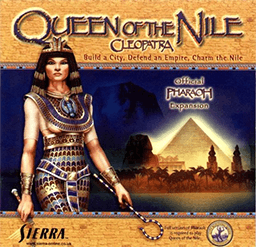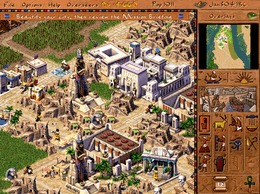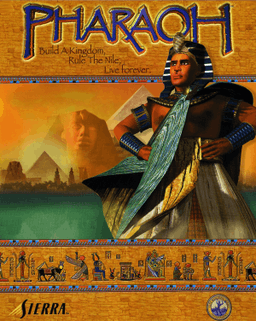Pharaoh (video game)
| Cleopatra: Queen of the Nile | |
|---|---|
 | |
| Developer(s) | BreakAway Games |
| Publisher(s) | Sierra Entertainment |
| Designer(s) | Chris Beatrice |
| Composer(s) | Keith Zizza |
| Series | City Building Series |
| Engine | Isometric projection |
| Platform(s) | Windows |
| Release | 2000 |
| Genre(s) | City-building game |
| Mode(s) | Single-player |
Pharaoh is an isometric city-building game that was released on October 31, 1999, created by Impressions Games and published by Sierra Entertainment, for Microsoft Windows. Using the same game engine and principles of Caesar III (also by Sierra Entertainment), it is the first such game in Sierra's City Building series to focus on another civilization of ancients times, with players overseeing construction and management of cities and settlements in Ancient Egypt, micro-managing every aspect of the city, while also ensuring its citizens are fed, employed, healthy and protected from diseases, disasters and wars.
The game was complemented with an expansion pack called Cleopatra: Queen of the Nile, developed by BreakAway Games the following year, which extended the game's main campaign into the Hellenistic period. Both the original game and expansion pack are commonly referred to, and may be purchased as one, under the title Pharaoh and Cleopatra.[1]
Gameplay
Pharaoh is played from a two dimensional isometric perspective, with the magnification level fixed but the viewing angle able to be changed, but only at 90 degree angles, either counter-clockwise or clockwise. Much of the control is managed through the mouse and keyboard-shortcuts, with the game using an interface system like Caesar III, with buttons incorporated on it linked to different types of construction the player needs for their city (housing, roads, schools, warehouses, etc.), as well as buttons to view messages, undo mistakes and cycle through trouble-spots, along with a map of the region Ancient Egypt extended into, a group of advisers, called Overseers, that the player can rely on for information on the city's development and any problems encountered, and in-game overlays that can detail any rising issues and if housing is getting what it needs for its current level. All aspects of city life, such as housing, religion, warfare, and trade, are designed carefully to closely reflect that of actual Ancient Egyptian cities of the time, including the goods and services that they had available, with names of various pharaohs used in the game along with the appearance of historical characters from the period of Egypt's ancient history; limited encyclopedic information about ancient Egyptian practices is provided in the game's help menu and instruction booklet. While the game uses the deben as its currency, in reality it is not the case as no standardised pieces of metal have been found to indicate the actual currency of Ancient Egypt. Although the puzzle-like aspect of Pharaoh keeps the simulation far from realistic, the game stays true to the chronological order and timing of major events in the history of Egypt, including monument construction, wars and national disasters, the births and deaths of notable leaders, and the founding and fall of ancient cities.
Game modes
The game features two modes of play - Campaign and Free-Build. In campaign mode, players focus on establishing cities during different periods of Ancient Egypt, initially working on nomad settlements, before being entrusted with building up trade centres, grand cities, tombs and pyramids, and fabulous monuments for various Ancient Egyptian leaders, earning promotions until they attain the rank of Pharaoh themselves. Players operate in five periods of Ancient Egyptian history (six with the inclusion of Cleopatra) with the first period acting as a tutorial to some of the basic elements of the game, such as food and security. In later periods, players get a choice between two missions, one often being a peaceful mission, the other being military in nature, but only one of the two needs to be completed to move on in the campaign.
In Free-Build mode, players are given a choice of around a dozen standalone scenarios, some without win conditions allowing open-ended "sandbox" city-building, others having goals to attain. A map editor is provided with the game to facilitate the creation of user-designed scenarios for this mode.

New gameplay elements
While many of the elements of the game, from housing to industry, borrows from Caesar III, the game distinguishes itself with some notable differences and some new features:
- Goals: While Population, Prosperity and Culture are still retained in the game, Favor is renamed as "Kingdom" and maintains the same function in that the score is based upon the ruling Pharaoh's view on a player's performance to meeting their goals, bolstered by gifts sent to them. Peace is replaced with a new goal, "Monument", which focuses on player's efforts to establish the monuments needed within their city; players will usually be given the knowledge of the monuments they need to build in the goals during a briefing of their next mission.
- Infrastructure: Large bridges are not available in the game due to the Ancient Egyptian setting; while players can build small, wooden bridges, larger bodies of water can only be traversed by ferries, which require two stations set up in line with each other. A new feature in infrastructure is the inclusion of roadblocks, which function like gatehouses but are much simpler to implement, and can help players control where roaming walkers go, thus keeping those providing a needed service (i.e. Temple Access) from wandering into areas they shouldn't be going to; walkers with destinations (such as a warehouse worker getting goods) are not stopped by roadblocks.
- Water & Health: Water can be acquired from two buildings - Wells and Water Sources - but both must be placed on terrain where ground water is available; if there is no grass on the land, there is no water beneath it. Wells can supply instant access to water, but are undesirable to live by and the source is not clean. Water Sources are nicer to live by and send out walkers to provide housing with access to it. While players can provide Doctors, Barbers are replaced with Dentists, who enhance culture and housing levels, and Hospitals are replaced by Mortuaries, which improves health levels but must be supplied by Linen to function properly. Because of the threat of Malaria within the game, players may also build Apothecaries to prevent this and raise health levels.
- Hunting, New Foods, and Farming: Along with farming and fishing providing sources of food, Pharaoh introduces hunting, which requires the building of Hunting Lodges where Game Animals are available, and supplies Game Meat. In addition to Game Meat, players may also harvest from farms crops of Chickpeas, Pomegranates, Lettuce, Figs and Grain, and can also acquire Meat from Cattle Ranches so long as they are supplied with Straw. The game has two types of farming that can provide both food and raw materials - Meadow Farming (which functions similar to farms in Caesar III), and Floodplain Farming - with each having advantages and disadvantages:
- Meadow Farming - Must be built on fertile land; must have access to labour; provides low yields regularly, with the amount affected by fertility.
- Floodplain Farming - Must be built on floodplains; needs no labour, but does need access to a Labour Camp for crops to be grown; provides high yields yearly, but farms rely on Nile's flooding for high fertility and become inaccessible while flooded, while any harvests left in the floodplains when they are flooded are lost.
- A further addition to farming is the inclusion of irrigation, which functions differently between the two types of farming, but affects fertility and thus yields. While floodplain farms can improve fertility with ditches, they are regularly improved when the Nile floods, but farms on meadows have a fixed fertility that can only be improved by building ditches around them and drawing up water from the banks of the Nile through pumps; if the pumps are placed at floodplains, the pump must have a ditch in the plain below that is connected to the water.
- Religion: While the game has five gods to appease (much like those in Caesar III) - Ra, Bast, Osiris, Ptah, and Seth - who each focus on a different aspect of city development (i.e. Seth focus on warfare), each city only has a small handful of them present that need appeasing. One god is chosen as the patron deity of the city while the others are the local deities; while all need equal appeasement, the patron deity will expect more than the local deities. Players have construct Shrines and Temples for this purpose, but while the former can appease the gods, the latter is the only one that can supply Priest walkers who provide housing with access to religion. Most cities can build a large Temple Complex to any of the gods, though it is often the patron deity that is allocated one. Once a Complex is built, it will not only confer a desirability bonus to the area surrounding it, but can be enhanced with two additions (or add-ons) that will confer small bonuses to the city, such as increased speed in producing goods, or greater chances of victory in battles, depending on the god the complex is for. Like Caesar III, gods bestows gifts when appeased and disasters when angered, depending on the role they play in; Osiris for example, can bestow gifts that improve the flooding of the Nile and increase yields, but can withdraw the Nile's annual flooding if angered, while Bast, when appeased, will throw a festival at no cost to the city, which can be helpful for appeasing the other gods.
- Raw Materials & Goods: While the harvesting of clay, timber, fish, and the manufacturing of pottery remain, Pharaoh brings in a range of new raw materials and goods. New raw materials include: Flax and Barley, which are harvested at farms of the same name, and Straw, which is a by-product from harvesting Grain; Reeds, which are acquired from reed fields; Sandstone, Limestone, Granite and Plain Stone, which are harvested at quarries placed next to rocks; Gems, which are mined from rocks; Gold and Copper, which are mined from sites where metal deposits can be seen in the rocks, though what can be mined varies between regions. Of the raw materials introduced, some go on to form new goods. Timber is now used in construction of ships; Reeds are used to make Papyrus scrolls; Gems are used to make Luxury Goods; Barley is used to make Beer, needed for some entertainment venues and for festivals; Copper is used to make Weapons; Straw, coupled with Clay, makes bricks for some of the earlier tombs that players can build, and is also needed for Cattle Ranches that in turn provide Meat; Flax is used to make Linen. In addition, players may trade for a second luxury good, which is essential for evolving houses to higher levels, Gold that is mined must be taken to the city's Palace (regardless of what type it is), and the type of stone vary from region to region, meaning that unavailable types required for a monument must be imported through trade.
- Entertainment: Most venues in the game need to be built at an intersection, but will supply walkers that give access to entertainment. Senet Houses don't need to be at intersections, but do need Beer to function. Festivals to the gods the city is appeasing cannot be held without a festival square, which requires a crossroad intersection and plenty of space before it can be built.
- Education: Both structures, Schools and Libraries, will only supply a walker to give housing access to education if the player supplies them regularly with papyrus scrolls, whether from manufacturing them or importing them.
- Civil Service: Much like the Senate building of Caesar III, the Palace operates as the main treasury of the building, provides info on the scores it has achieved so far, and is desirable to live by, but is essential in cities where Gold can be mined, as it must be taken to the Palace to be added to the city's funds. While Architects operate out of their own building like Caesar III, Fire and Crime prevention are done by two separate buildings and walkers - Fire Posts and Fire Marshals; Police Stations and Constables. Players may also build Courthouses, which further help with crime prevention and is needed for housing to evolve to higher levels after being given access to it by the Magistrate walker.
- Military: Pharaoh features three different unit types, Infantry, Archers, and Chariot Riders. Archers don't need any special equipment, however Infantry require Weapons, made from Copper, and Chariot Riders also require Chariots, made from Timber, to be recruited.
- Naval Warfare: A new feature to Pharaoh is the ability to perform naval combat in a city. Players have access to two types of ships - Transports, which can ferry ground troops across water, and Warships, which can be assigned to combat enemy ships that arrive in the region. Multiple ships of each type can be built, but require wharves to build them and a supply of timber.
- Monuments: A new feature to the series, monument building allows players to construct monuments from Ancient Egyptian history, whether it is a tomb or an obelisk. Such projects require a construction site being designated by the player, along with providing labour camps for unskilled workers, guild quarters for skilled workers, and warehouses containing materials needed for the monument. Progress takes time, with players often needing to import some materials not available in the region they are in, while unskilled labour is more committed to working on a monument when there are no floodplain farms available to work on due to the Nile's annual flooding. Most monuments also require timber to provide scaffolding, and tombs often require provisions of goods to be supplied for them. Sometimes appeased Gods may supply construction blessing which add progress to one or more of the current monuments. The type of monument that can be built varies in the main campaign.
Reception
Pharaoh garnered mainly positive reviews, with a rating of 4.5 out of 5 on CNET Download.
References
External links
- Pharaoh at MobyGames
- Pharaoh Fasttrack Guide, containing mission walkthroughs.
